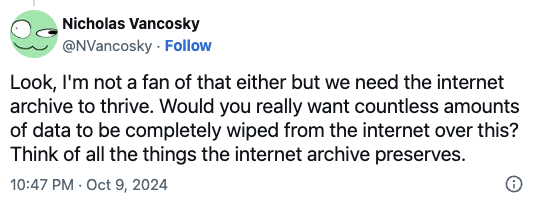A non-profit that benefits millions of people has fallen victim to a data breach and a DDoS attack.
Internet Archive, most known for its Wayback Machine, is a digital library that allows users to look at website snapshots from the past. It is often used for academic research and data analysis.
Cybercriminals managed to breach the site and steal a user authentication database containing 31 million records. The stolen database contains authentication information for registered members, including their email addresses, screen names, password change timestamps, Bcrypt-hashed passwords, and other internal data.
Who stole the database and why is not yet known. An unverified source told Malwarebytes that login credentials for the Azure servers of the Internet Archive were found in an information stealer log shared on the Dark Web, which could have offered someone the opportunity for a minimum-effort attack.
To pile more grief onto the breach, a “hacktivist” group calling themselves SN_BLACKMETA has launched several DDoS attacks against Internet Archive’s website archive.org for all the wrong reasons.

Their tweet which explains their motivation hasn’t gone down well among X users, with many commenting that the Internet Archive is not connected to the US Government and, in fact, a very useful tool.

Since the objective behind the DDoS attacks is no doubt attention-seeking, it is unlikely that the same group is behind the data breach as they haven’t claimed responsibility.
Internet Archive founder Brewster Kahle posted an update on X:
What we know: DDOS attack–fended off for now; defacement of our website via JS library; breach of usernames/email/salted-encrypted passwords.
What we’ve done: Disabled the JS library, scrubbing systems, upgrading security.
Will share more as we know it.
For now, anyone who suspects they’re affected by the data breach should follow our tips below. We’ll keep you updated on any developments in the story.
Protecting yourself after a data breach
There are some actions you can take if you are, or suspect you may have been, the victim of a data breach.
- Check the vendor’s advice. Every breach is different, so check with the vendor to find out what’s happened, and follow any specific advice they offer.
- Change your password. You can make a stolen password useless to thieves by changing it. Choose a strong password that you don’t use for anything else. Better yet, let a password manager choose one for you.
- Enable two-factor authentication (2FA). If you can, use a FIDO2-compliant hardware key, laptop or phone as your second factor. Some forms of two-factor authentication (2FA) can be phished just as easily as a password. 2FA that relies on a FIDO2 device can’t be phished.
- Watch out for fake vendors. The thieves may contact you posing as the vendor. Check the vendor website to see if they are contacting victims, and verify the identity of anyone who contacts you using a different communication channel.
- Take your time. Phishing attacks often impersonate people or brands you know, and use themes that require urgent attention, such as missed deliveries, account suspensions, and security alerts.
- Consider not storing your card details. It’s definitely more convenient to get sites to remember your card details for you, but we highly recommend not storing that information on websites.
- Set up identity monitoring. Identity monitoring alerts you if your personal information is found being traded illegally online, and helps you recover after.